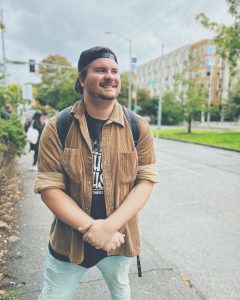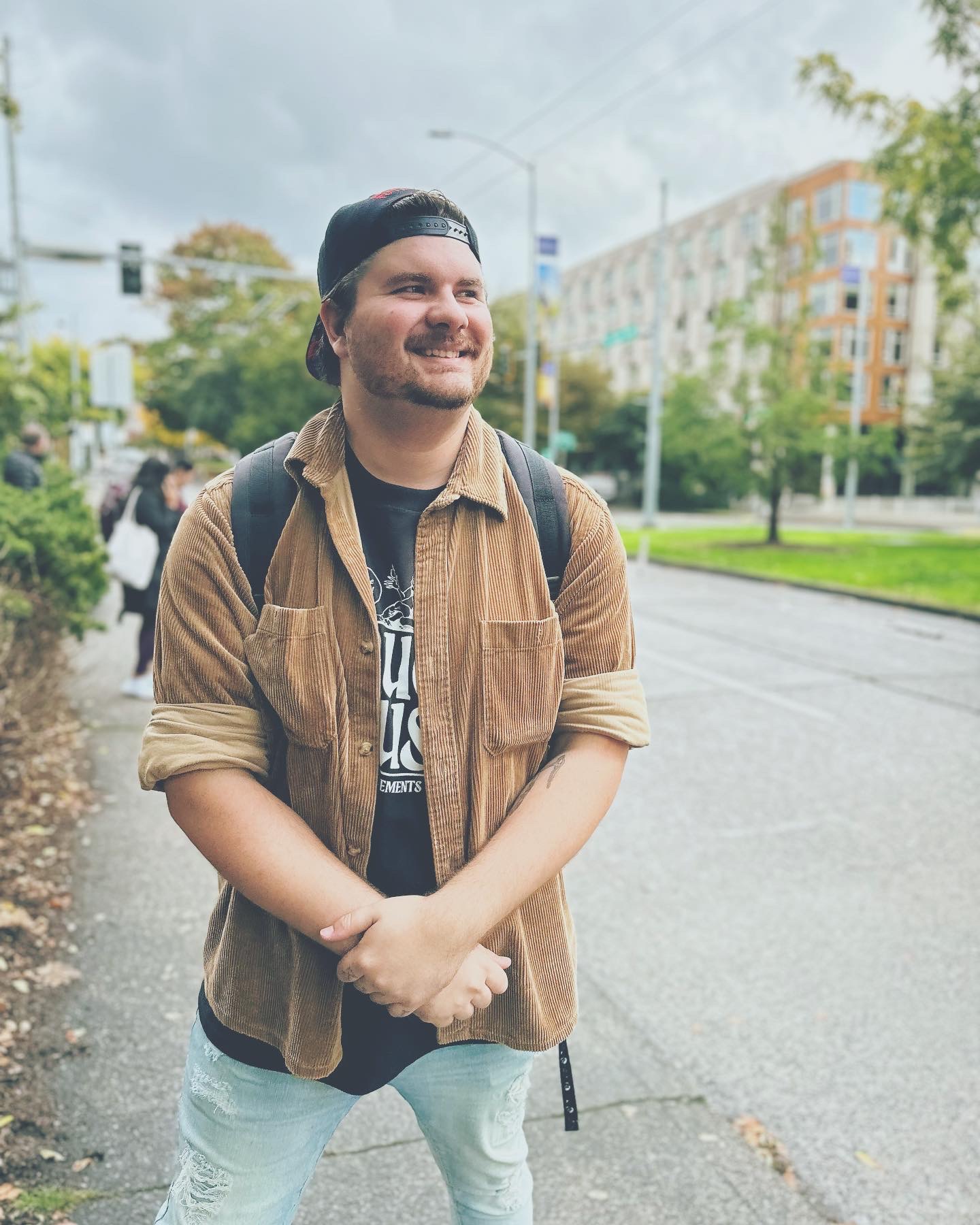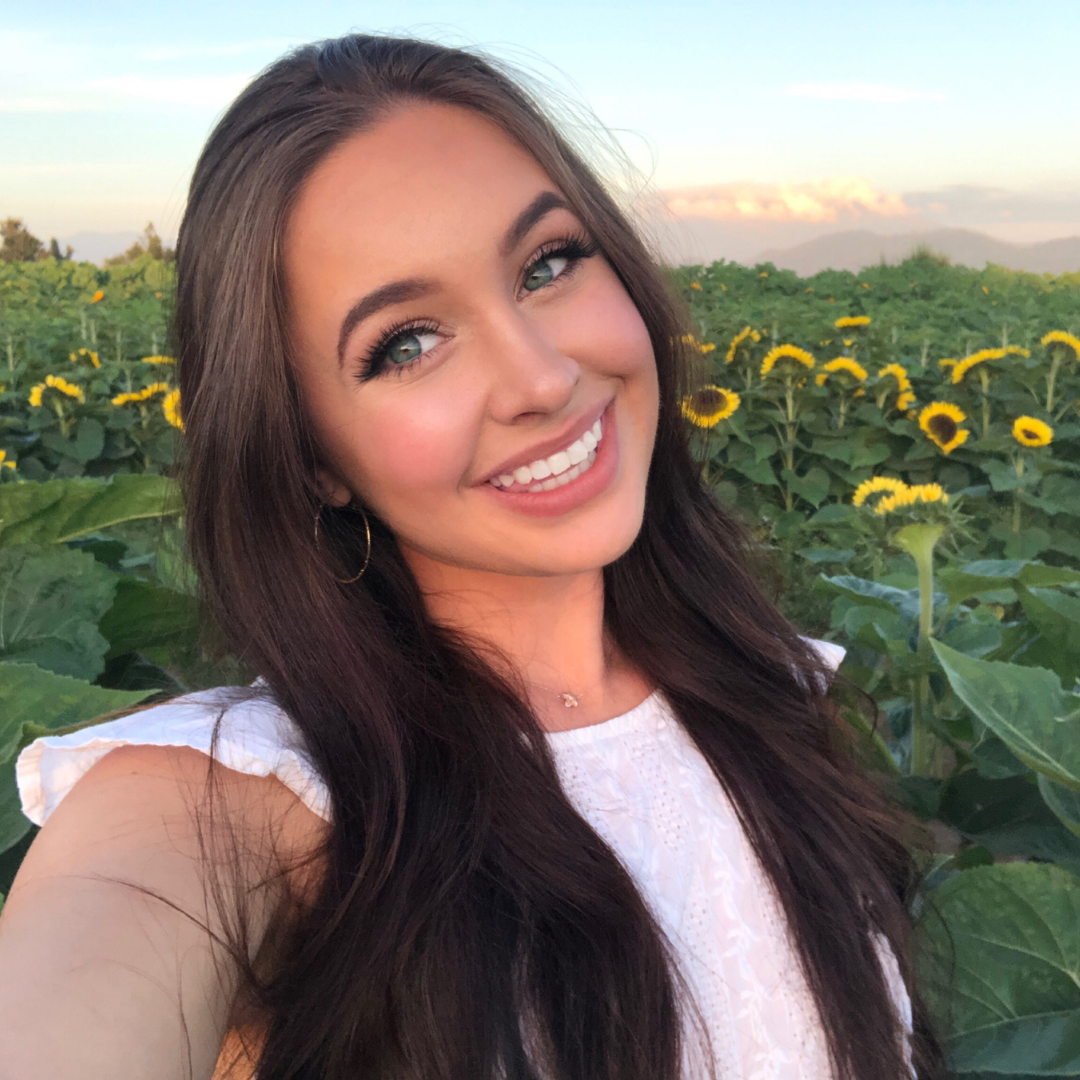From an English Major to a Curatorial Practicum: Kellyn Leclerc’s launch into uncharted territory

When we think of curators, we often imagine individuals with backgrounds in Visual Arts or Art History, meticulously assembling exhibitions with years of specialized training. But what happens when a storyteller, a writer with a passion for community engagement, steps into the role?
Meet Kellyn Leclerc, a Bachelor of Arts student whose love for storytelling carved an unexpected path into curation. Kellyn’s journey twisted with the unpredictability of a well-spun tale, leading him to The Reach Gallery, where he transformed words into visual narratives and sparked conversations through art.
From a young age, Kellyn was drawn to the art of storytelling. While initially planning to pursue Social Work, he found himself captivated by the world of literature, eventually transitioning into full-time English studies.
Taking a leap into the unknown
Despite not having a background in Visual Arts, Kellyn saw an open position for UFV’s student curatorial role at The Reach Gallery. This is a competitive eight-month internship that is typically offered to UFV’s BFA and VA students. Instead of doubting his qualifications, he took a leap of faith:
“When I first got the email invitation to apply for the position, it was one of those moments in my life where I figured, why not? I don’t have a background in Visual Art or Art History, but I do have a passion for community engagement and discussion.”
What Kellyn discovered was that curation wasn’t just about art—it was about storytelling. His experiences in Social Work courses and his time as a concert promoter in the local punk music scene helped shape his ability to organize events with a strong thematic narrative.
“As a curator, it’s critically important to have a nuanced understanding of the type of community you’re working in, and how the works you select for presentation might connect to said environment. Years ago, when I organized all-ages punk shows, I thought not just about the bands, but about how their identities created a larger story through the night. That same mindset helped me as a curator, crafting a visual art experience that could inspire meaningful, reflective discussion.”
After months of preparation, Kellyn’s curated exhibition debuted at The Reach Gallery. It was a night to remember for the audience and for all those who had taken a chance on him.
“What I witnessed during the intro to the exhibit you curated at The Reach was nothing short of magical. You were so in tune with the artist’s work and intentions. It has been a pleasure to watch you tap into your creative passions and talents over the past year. Despite any personal obstacles, you have only demonstrated resilience and professionalism—without compromising who you are.” – Tamara Courage, Arts External Liaison Coordinator at UFV – College of Arts.
“When I was a child, my family was told I might not graduate high school due to my diagnosed learning disability. So, now it feels incredibly surreal to be this far into my degree.”
Looking to the future
So, what’s next for Kellyn?
He is currently weaving his first horror novel into existence: a Lynchian-inspired ghost story set at an evangelical Christian summer camp. Writing remains his deepest passion, but his love for community arts continues to grow, shaping a future where storytelling extends beyond the page and into the heart of the world around him.
When asked what advice he would give to students considering a practicum, Kellyn doesn’t hold back:
“How do you expect to find a job post-graduation if you haven’t built a network of contacts or a portfolio of real-world experience? Do you think you’ll just be handed a degree and land a job instantly? Practicums are the key to unlocking doors—they let you prove your skills to the very people who can shape your future.”
For those considering English as a major, Kellyn’s advice is just as bold:
“Keep an open mind. Say yes to opportunities—even when they seem outside your comfort zone. An English degree isn’t a limitation; it’s a launching pad. Whether you go into journalism, publishing, editing, community programming, or teaching, the only limit is how wide you’re willing to open the door.”
Kellyn’s journey—from horror writer to gallery curator—proves that storytelling isn’t confined to books. It lives in art, music, conversation, and the spaces between words, shaping the world in ways we least expect. Whether through literature or curating, his ability to craft meaningful narratives has opened doors that once seemed out of reach.
And sometimes, the biggest opportunities come from simply asking yourself: ‘Why not?’


